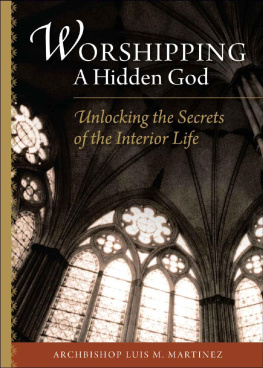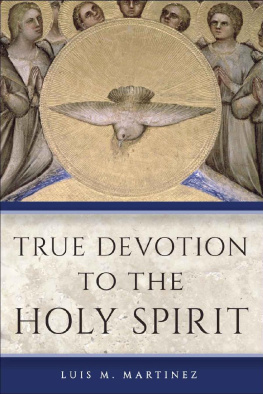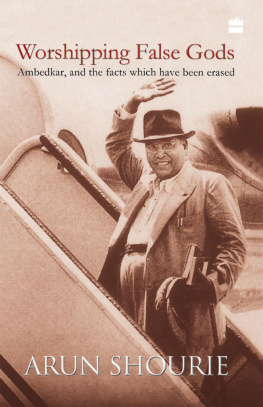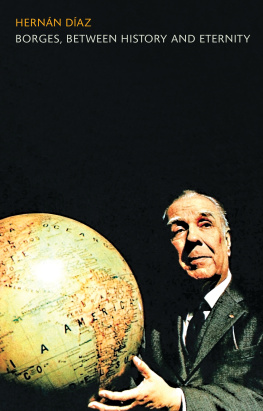Archbishop Luis M. Martinez - Worshipping a Hidden God
Here you can read online Archbishop Luis M. Martinez - Worshipping a Hidden God full text of the book (entire story) in english for free. Download pdf and epub, get meaning, cover and reviews about this ebook. year: 2014, publisher: Sophia Institute Press, genre: Science. Description of the work, (preface) as well as reviews are available. Best literature library LitArk.com created for fans of good reading and offers a wide selection of genres:
Romance novel
Science fiction
Adventure
Detective
Science
History
Home and family
Prose
Art
Politics
Computer
Non-fiction
Religion
Business
Children
Humor
Choose a favorite category and find really read worthwhile books. Enjoy immersion in the world of imagination, feel the emotions of the characters or learn something new for yourself, make an fascinating discovery.
- Book:Worshipping a Hidden God
- Author:
- Publisher:Sophia Institute Press
- Genre:
- Year:2014
- Rating:4 / 5
- Favourites:Add to favourites
- Your mark:
- 80
- 1
- 2
- 3
- 4
- 5
Worshipping a Hidden God: summary, description and annotation
We offer to read an annotation, description, summary or preface (depends on what the author of the book "Worshipping a Hidden God" wrote himself). If you haven't found the necessary information about the book — write in the comments, we will try to find it.
Worshipping a Hidden God — read online for free the complete book (whole text) full work
Below is the text of the book, divided by pages. System saving the place of the last page read, allows you to conveniently read the book "Worshipping a Hidden God" online for free, without having to search again every time where you left off. Put a bookmark, and you can go to the page where you finished reading at any time.
Font size:
Interval:
Bookmark:
Worshipping a Hidden God
Unlocking the Secrets of the Interior Life
Luis M. Martinez
SOPHIA INSTITUTE PRESS
Manchester, New Hampshire
Worshipping a Hidden God is an abridged edition of the book published in 1949 by B. Herder Book Co., St. Louis, Missouri. In this 2003 edition by Sophia Institute Press , which contains a biographical note about the author and minor editorial revisions to the original text, the chapters have been retitled, and the longest chapter in the original edition has been divided into smaller chapters.
Copyright 2003 Sophia Institute Press
Printed in the United States of America
All rights reserved
Cover design by Theodore Schluenderfritz
No part of this book may be reproduced, stored in a retrieval system, or transmitted in any form, or by any means, electronic, mechanical, photocopying, or otherwise, without the prior written permission of the publisher, except by a reviewer, who may quote brief passages in a review.
Sophia Institute Press
Box 5284, Manchester, NH 03108
1-800-888-9344
www.SophiaInstitute.com
Imprimi potest:
Marshall J. Winne, C.M., Provincialis
December 16, 1948
Nihil obstat:
G. H. Guyot, C.M.,
Censor librorum
Imprimatur:
Joseph E. Ritter,
Archbishop of St. Louis
Other books by Luis M. Martinez from Sophia Institute Press :
True Devotion to the Holy Spirit
When Jesus Sleeps
Dedicated to Our Lady of Guadalupe, whose motherliness is so tender that she needs only to be known to be loved
H. J. Beutler, C.M. S.T.L.,
Translator

Translators note
In Mexico, the writings of Archbishop Luis M. Martinez are justly held in high esteem. When I first happened on some of them, I was moved by their deep spirituality and charmed by their simplicity of style, but, particularly, I was amazed to learn that no one had ever attempted to translate them into English. Feeling that the spiritual riches lodged in the conferences of the distinguished archbishop merited expression in English, because of the great good that could be effected by a wider diffusion of them to souls yearning for perfection, I decided to undertake the task of rendering his Simientes Divinas into my native tongue under the title Secrets of the Interior Life.
From first to last, the work has been a labor of love. At times, to be sure, I grew discouraged in my attempts to give a fitting English dress to the exquisite Spanish of the archbishop. The thought, however, of the spiritual good for souls that an English version of one of his works would undoubtedly effect steadied me in my labors.
I have tried always to be faithful to the thought of Archbishop Martinez, and even though I may not have succeeded in giving to the translation the elevated tone of the original, I trust that my modest efforts will nevertheless provide profitable spiritual reading for English readers.
If only one person is brought closer to God by his perusal of the present volume, I shall feel amply rewarded for my undertaking; for one of the chief secrets of the interior life is the golden truth that in the very act of bringing others nearer to God, we ourselves are invariably drawn closer to Him also.
H. J. Beutler, C.M. S.T.L.
Preface

God calls you to sow the seed He has placed in your heart
Behold, the sower went forth to sow.
I have seen the enchanting scene. In the exhilaration of the dawn, when the sky is filled with colors and the earth with melodies, the sower goes out to sow his seed. Over the newly turned furrow, over the moist and warm furrow, he walks slowly, rhythmically, with such even gait that he appears to be a mechanical figure. One would say that his eyes gaze not so much on the distance of the horizon as on the vistas of the future; that on his lips is traced the smile of hope; that in dreamy harmony with the delicate canticle of nature, as it comes to life, his spirit dreams of the future, of the abundant harvest that the rich earth will produce.
His hand scatters the wheat with masterly skill, and as the ruddy grains fall upon the black soil, they appear, in the splendor of the rising sun, like a shining fan of gold. One after another, the handfuls of wheat are cast upon the ground, while the fields gradually fill with light, and great numbers of birds flutter over the newly sown earth all very black, very talkative, very restless.
The grains of wheat buried in the ground will die, for death is the indispensable condition of life; they will die to live again. From each one of them will rise a sturdy and luxuriant stalk, and from each stalk a multitude of ears rich with grain.
Among the sacred monuments of Hellenic art in the streets of Athens, the center of the ancient civilization, there walks with majesty a man. A heavenly light shines in his eyes, and from his lips there issues, like the exquisite honey of Mount Hybla, words full of depth and unction.
In the bosom of the corrupt Athenian society, Socrates sows the seed of the word, the seed of truth. Perhaps it germinates in the depth of his soul because of the supernatural breath of a hidden spirit. Perhaps it develops in the mysteriousness of his transcendent rapture. Perchance it grows with the warmth of his profound meditations. Who can know?
One day the philosopher went forth, his soul filled with the heavenly seed, and he lavished the golden fan of his word upon the barren furrow. He illuminated many souls, he changed many hearts, he provoked many discussions, while his eyes searched the distance of the centuries, and the smile of an undying hope formed on his lips.
The word of Socrates died to be born again. Through its magical influence, Plato and Aristotle arose; and upon them, as in a sturdy and everlasting trunk, the Church grafted, in the Middle Ages, the tremendous scholastic synthesis, the glorious synthesis that will never die.
What force does the human word possess that it thus perdures, that it thus transforms, that it thus extends itself?
God has placed in it life and hope.
From the mysterious bosom of the Father and from the virginal bosom of Mary there came forth, in the midst of the splendors of sanctity, the true Sower, the only Sower, Jesus.
Upon the ungrateful soil of the human race, whence germinated only thorns and briars, He came to sow His words of eternal life, His seed the only fruitful seed, the only seed that does not die, because it is the word of God: The seed is the word of God.
To speak the truth, the seed of the fields and the seed of souls, the wheat of the farmer and the word of Socrates, are always the word of God, a reflection, an image, an echo of the Word of God. How could fecundity and life come from any other source?
There is only one seed: the word of God. All else is a figure or a resemblance. The biblical phrase The sower went forth to sow is applicable in its full extent to Jesus alone.
For thirty-three years, the divine Sower sowed upon the earth. He sowed silently at Nazareth, sweetly on the Mount, lavishly in Tiberias, gloriously on Thabor, ineffably in the Cenacle, sorrowfully in Gethsemane and on Calvary. His seed is one and multiple, as the sacred Scriptures say: one because it is the Word of God; multiple because in that Word is everything by Him all things consist light, love, counsel, hope, happiness.
Next pageFont size:
Interval:
Bookmark:
Similar books «Worshipping a Hidden God»
Look at similar books to Worshipping a Hidden God. We have selected literature similar in name and meaning in the hope of providing readers with more options to find new, interesting, not yet read works.
Discussion, reviews of the book Worshipping a Hidden God and just readers' own opinions. Leave your comments, write what you think about the work, its meaning or the main characters. Specify what exactly you liked and what you didn't like, and why you think so.













